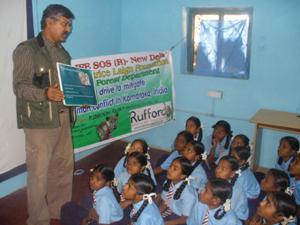Usham Singh
Other projects
15 Feb 2011
Developing Solutions for Leopard-Human Conflict in Karnataka: Education Drive to Reduce the Leopard-Human Conflict
Human-leopard conflict is rising in most regions where leopards occurred in India. The project aims in developing solutions for human-leopard conflict with the involvement of local community in Deccan regions of Karnataka.

Mr. Samad Kottur during a school programme at Chitradurga.
A study on ecology and human-leopard conflict was initiated in Sanapur Community Reserve, Karnataka, during 2007. We held meetings with Forest Officers and discussed the issue of human-leopard conflict. It motivated us to conduct the conservation works in larger parts of the state. In the first six months of the study, the project will focus on achieving two targets; viz., firstly, knowing the status and distribution of leopards from the existing records of the Forest Department and field surveys and secondly, magnitude of human-leopard conflicts in non-protected areas of the state.

Mr. Usham Singh and Mr. Samad Kottur during a college programme at Gorekote, Chitradurga.
An analysis on some critical information’s on age and sex of the people attacked by the leopard, livestock depredation, seasonal variation during the attack, habitat utilisation by leopards etc., will be carried out. The next three months of the study will be keenly focused on sharing these information’s and past experiences with the local people and education awareness programmes to be held in various zones of the state. We will also conduct capacity building workshops for the forest staff, who mainly deals with the conflicts.
In the last three months, we will procure four satellite imageries, mainly to plot the GPS locations to know the habitat use by the leopards and labelled as suitable, moderate and unsuitable habitats of the leopards. The study will provide recommendations to solve human-leopard conflicts at regional level.